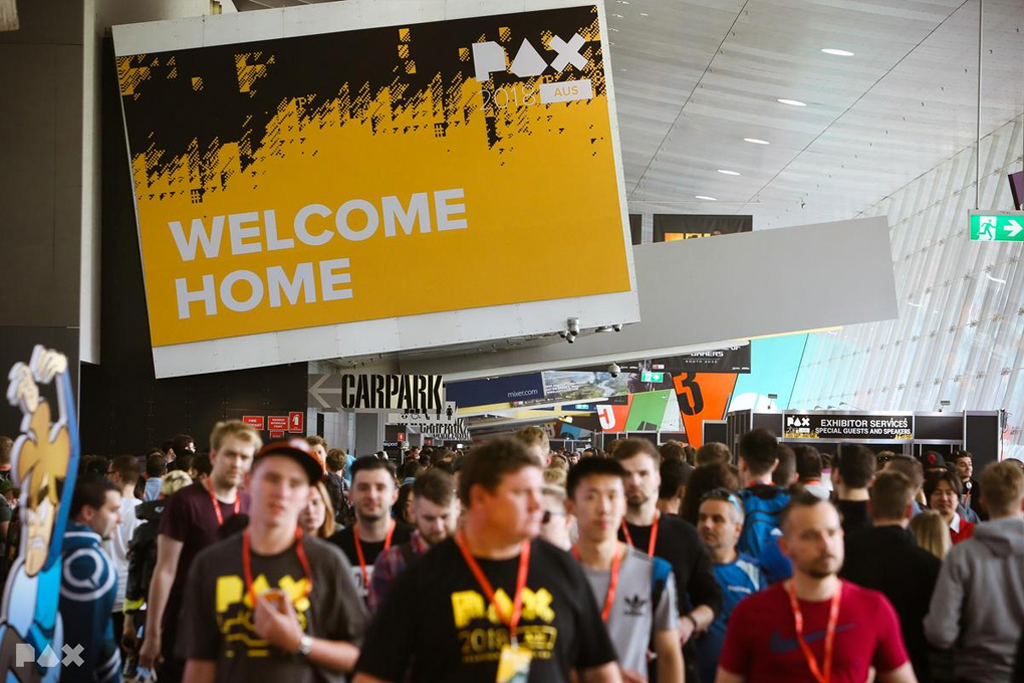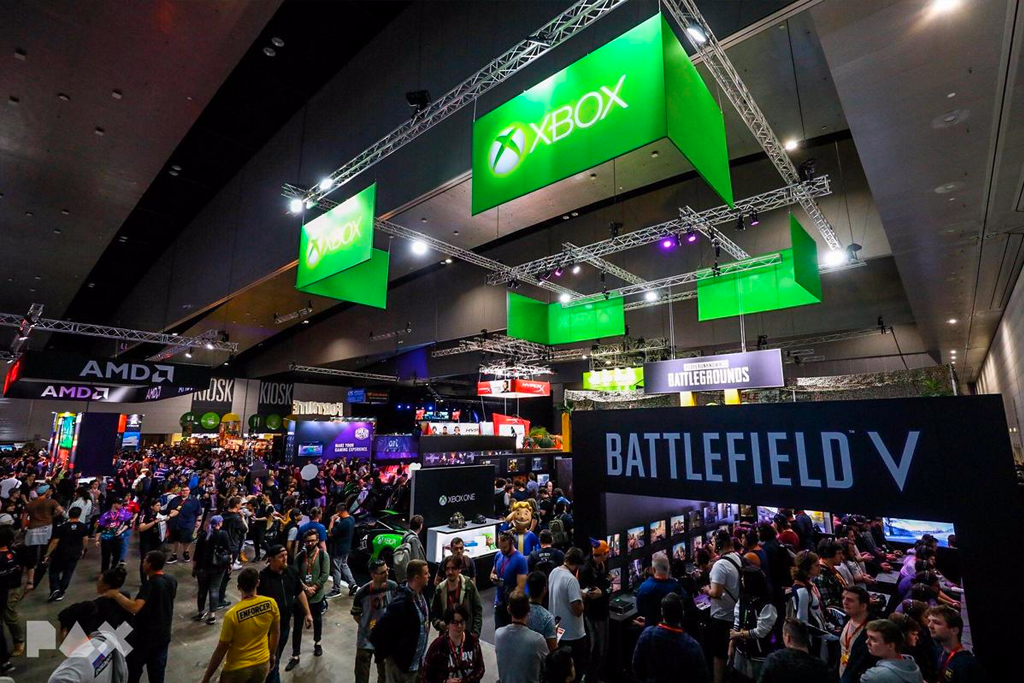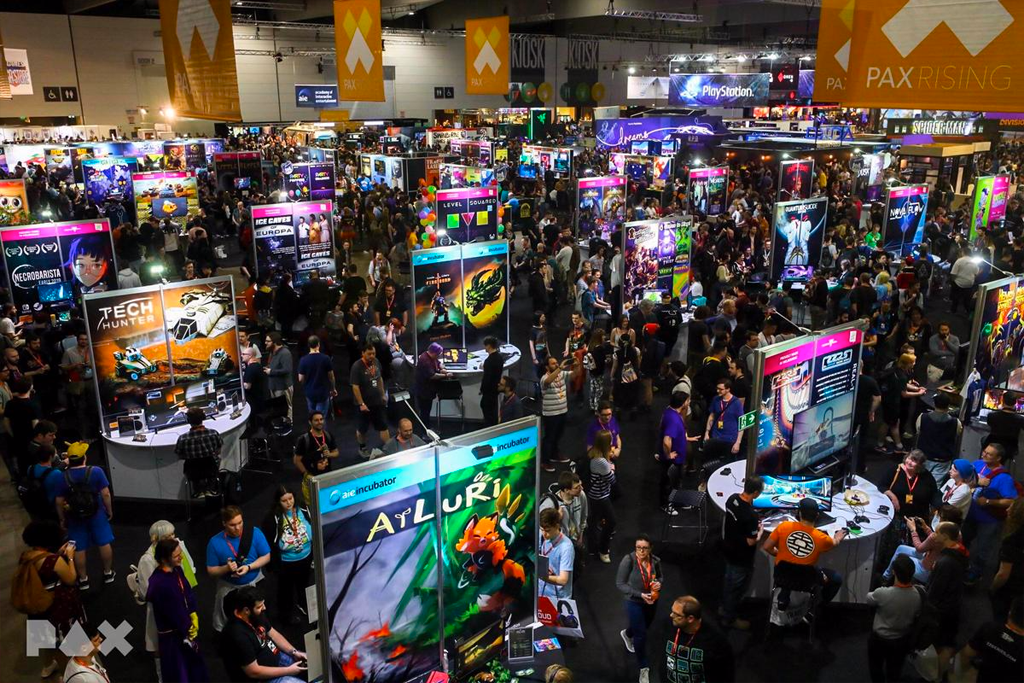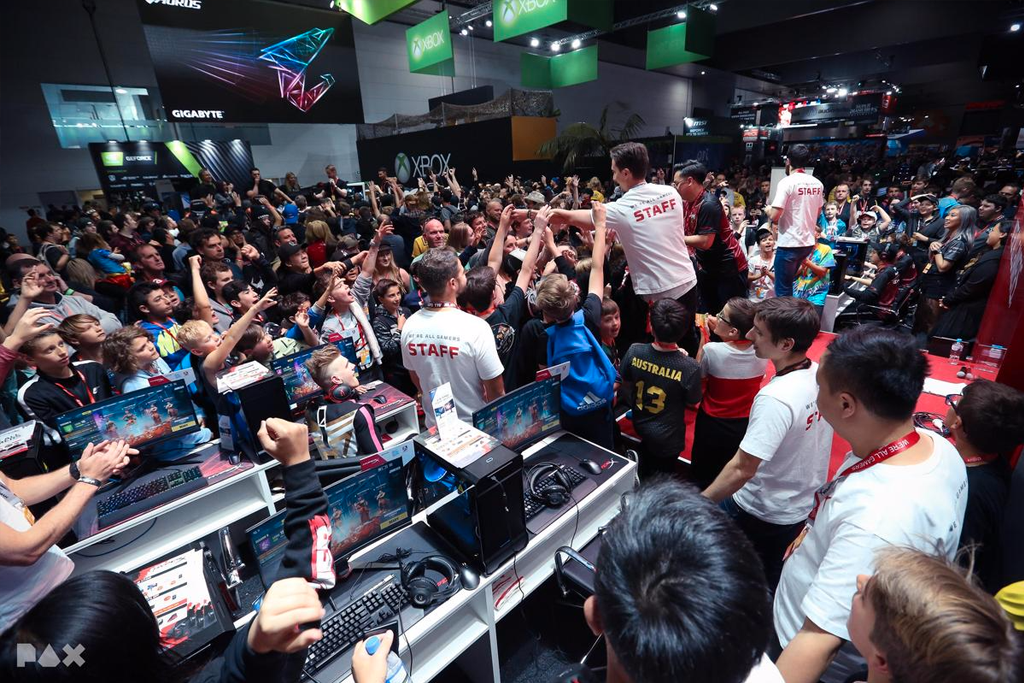World War II-era Rotterdam is loud. Despite its size and open-air environment, the noise of myself and thirty-one other people crackles close in my ears. Gunshots, smashed windows, explosions — all focusing my attention on the moment-to-moment gameplay of trying to survive this violent onslaught of bullets and shrapnel.
A stray bullet is loud. I catch one from somewhere across the river and I’m down. Bleeding out. I press the button to call for someone to come and help. To revive me with medical supplies before I die without achieving what I wanted to achieve. Then I remember that I’m the medic. The only one on my squad. I laugh as everything goes dark. The demo for Battlefield V is over. My fellow soldiers and I put down our controllers and get shuffled out of the booth. Thirty-two more people are eager to enter Rotterdam.
“In amongst all this noise, there’s one sound that’s missing.”
The show floor is loud. Hundreds of games and thousands of people. There are endless costumes throughout the crowd. Deadpool is holding hands with Sailor Moon. A group of Waluigis are protesting something and Spider-Man chats with Spider-Gwen. Long lines of people waiting to play games in every direction and every booth is blaring their game or product at high volume. Esports is loud. Fortnite dancing is loud. Zombie children and giant snakes are loud.
In amongst all this noise, there’s one sound that’s missing. An unmistakable sound that typically hums alongside all of this like an engine. A sound I only realise isn’t there until after it was all over — the sound of the internet.

PAX Australia: Welcome Home
Now in its sixth year, PAX Australia (short for Penny Arcade Expo) was once again held at the Melbourne Convention & Exhibition Centre this past weekend. A haven for video game fans, indie game developers, marketing companies, and probably most importantly, absolutely anyone. PAX’s motto is ‘Welcome Home’, a slogan tailor-made to make everyone feel invited, regardless of who you are and what you’re into.
Even more than previous years, this was clear throughout the three days and nights of the show. As games were played, friends were met and panels convened, a gradual but distinct sense of relaxation and fun emerged. It was weird. Obviously, this was a good thing but somehow, it felt unexpected.
The show floor never felt cramped and the space for tabletop games was bigger than ever. The independent games area was placed near the front entrance this year, which meant smaller indie titles were unmissable for everyone who walked through the doors. On the main show floor, people were excited by Kingdom Hearts 3 and willing to line up for two hours to catch a glimpse of the remake of Resident Evil 2. The Super Smash Bros booth towered over everyone waiting to play the new Pokemon game for Nintendo Switch. It was a widespread feeling of positivity and it was everywhere.
Towards the end of the third day, it became clear why: the internet didn’t exist at PAX. Everyone just seemed to forget about it.

Offline Gaming
The horrors of the modern internet were not represented anywhere. There was no white supremacy or homophobia booth. There wasn’t a panel featuring a Youtuber screaming at a room of strangers about how ‘social justice warriors’ have ruined what he loves. Nobody was cosplaying as Tech Company CEO Who Isn’t Sure That Censoring ‘Different Views’ Is The Right Thing To Do But He’s Listening.
Women were overwhelmingly present in every area and dudes weren’t questioning why they exist. Genderfluid and non-binary people were not only on the show floor, they were game developers terrified in the hope that their game demo was going to work correctly. Like every other exhibitor.
Thousands of people left the worst parts of the internet behind and played games. The feeling of excitement in the months leading up to, and during, the show immediately explained why people tolerated queueing for hours. It was worth it. For three days of not being bombarded by trashbag humans online using racial slurs or being angry about Star Wars: The Last Jedi, you bet people lined up across the Yarra River just to get through the doors. It felt like a huge relief.
“Any horrifying topics that may get thrown around like a dog toy on social media don’t get the same oxygen when you’re just chatting face-to-face.”
It seems like a well-worn idea that the anonymity of the internet is one of its worst traits. But when you meet people at a convention like this and discuss games, that rule holds. Any horrifying topics that may get thrown around like a dog toy on social media don’t get the same oxygen when you’re just chatting face-to-face. The person in front of you might still have terrible opinions but when the overwhelming feeling of ‘Don’t Say This Thing Out Loud’ drowns it out, there’s a possibility they may start to think those opinions aren’t all that valid in the real world. Because that’s all PAX is — playing games and talking to people. In person.
Sexualised ‘booth babes’ don’t exist at PAX Australia and they have a strict policy about tolerance and harassment. Despite any resistance from some ancient traditions of video game trade shows, guidelines like these eventually trickle down to the attendees. It gradually builds a reputation of acceptance and the more years they’re in place, the clearer it becomes that this is a convention that is moving into the future and if you don’t like it, you’ll be left behind.
Like a butcher cutting away the fat, PAX is video games at its leanest. Sliced down to its purest form. Free from the gristle of the internet and the spoiled taste of gamers complaining about ‘political correctness gone mad’. It has no sign of the stench which has grown ever more unbearable in recent years.

The Ideal State Of Video Games
Once it was over, it felt like it was time to return to the grind. Not just to flights home or day jobs, but the grind of the internet. The day-to-day sludge that modern human beings seem to wade through as 12-year-old white boys rage on webcams about non-existent concepts like ‘virtue-signalling’ while websites put their videos under the ‘Trending’ panel instead of banishing them into obscurity hell. Search for a Youtube video about any modern video game and you’ll quickly see someone like that kid in your recommendations.
“Are people getting into video games through PAX getting more than they bargained for?”
So if this is the depressing state of video games outside of PAX, if it’s like this 362 days out of the year, is the three days at the Melbourne Convention & Exhibition Centre presenting a false image? Are people getting into video games through PAX getting more than they bargained for? Was this denying attendees a true representation of what the world of video games is actually like?
By all accounts, it’s actually the opposite. The positivity of PAX Australia seemed unusual because it presented itself as an ideal state of video games, instead of the typical garbage fire that we’re all supposed to have grown accustomed to in 2018. Despite the majority of companies only being there to market their wares for money, it’s a surface-level example of what emotional state can be achieved without the ugly component of bigoted scumbags tainting your favourite things. If only for a short time.
PAX Australia wasn’t a complete solution but it was a reminder. It was an unfiltered conduit between you and whatever you were excited about. A chance to play tabletop games with friends you only see once a year. To cosplay as your favourite anime character, regardless of gender or colour. Young kids who have yet to be exposed to the most awful corners of the internet (and thus be influenced by it) were wide-eyed with joy at the possibility of playing games before they were released. A safe, centralised place for all this to happen on an annual basis in Australia was the stuff of dreams even ten years ago.

Turning Down The Volume
Removing the noise of the internet at PAX Australia felt like coming up for air. A holiday from some of the worst parts of modern society while at the same time, an amplification of some of the best. Creativity and self-expression were freely encouraged over 72 hours for everyone in attendance. Not just for the fans playing games but also for the developers making them.
Only after it was all over, I noticed something else about my time with the demo for Battlefield V. Everyone was given headphones with a microphone while they were running around the ruined city of Rotterdam but for whatever reason, the voice chat on the headsets wasn’t working. Accompanying the sound of the game wasn’t the shouting of strangers in your ear, but rather the sounds of other games from the rest of the show. Dozens of games, with hundreds of people playing them. Afterwards, I realised I didn’t miss the voice chat at all.
PAX Australia turned down the volume of the internet and turned up the sound of games and the people who enjoy them. It celebrated the best aspects of video game culture while not even giving the light of day to the worst. While there are questions to be asked whether society should be taking cues from events designed to market soulless products to eager consumers, the sheer wonder and positive vibe for the fantasy worlds on display was undeniable for three whole days and nights. And once it was all finished, the internet didn’t seem quite as loud as before.
David Rayfield writes good things in good places like Gamespot, Kotaku, Medium and…elsewhere. Tweet him at @raygunbrown



